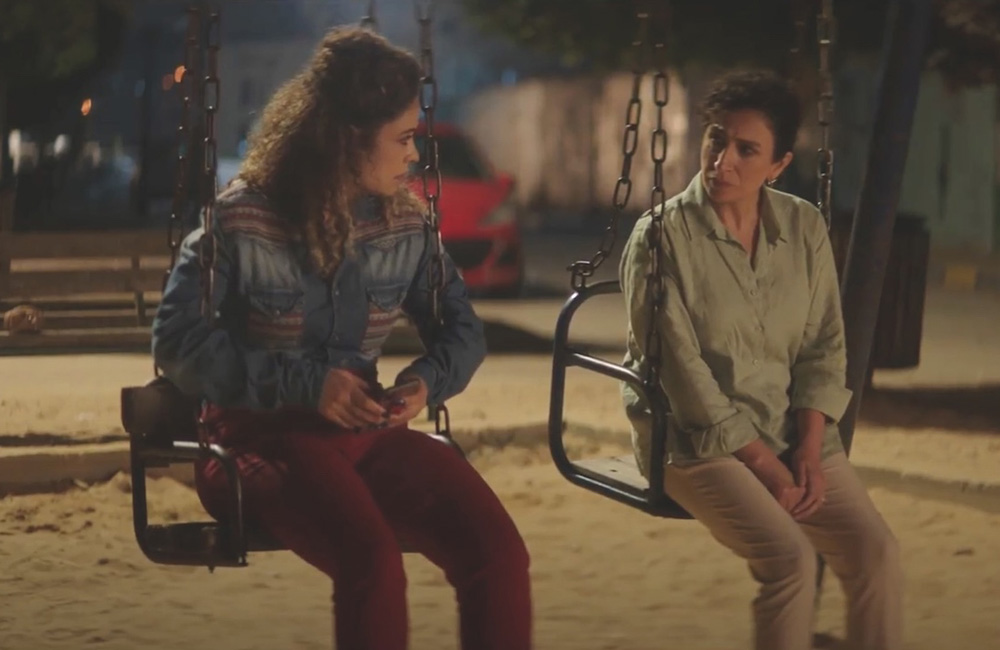When Noura (Yasmine Al Massri) arrives at her father’s house in “Thank You for Banking With Us,” she can’t make it to the door before the woman that’s long lived on the bottom level of the duplex in Ramallah grabs her attention, urging her to do something about the leak that’s permeated her ceiling from above. There’s likely been negligence over time, but Noura comes to discover her father is in no shape to do anything about it now, finding that he’s passed away once she finally makes her way into the house. After years of dividing her time working at a beauty salon and taking care of him, the death is more of a relief than a tragedy, the most difficult part of it having to call her sister Maryam (Clara Khoury), with whom she’s mildly estranged and her brother Akram, who is about as far away both geographically and otherwise in America. The leak may not register much with her as she becomes consumed with taking care of her late father’s affairs in Laila Abbas’ clever dramedy, but it lurks as a shrewd metaphor for the real issue for Noura and Maryam as they team up to withdraw what’s in their father’s bank account before it’s automatically bestowed to their brother as part of the patriarchal law of the land, cleaning up a mess that isn’t of their own making in a place where men hold all the power with generally little reward in return.
Given the prevailing attitudes, even Maryam has trouble believing her sister when she says their father intended to leave them every penny of the 165,000 he had in his account, but Noura insists that he wanted them to inherit it with their brother abroad and when no will was left to express this final wishes, the main obstacle becomes Palestinian Savings Bank which needs his sign-off to transfer the funds. As crafty as the sisters get in attempting to withdraw the full amount in such a short amount of time when they can’t report the death until they get cash in hand, Abbas shrewdly creates a scenario in which Maryam and Noura’s every move seems to require permission from men when they figure out that while they can say their father is too ill to show up in person, they need to arrange for someone to impersonate him to give his verbal confirmation. Finding someone who won’t report them or take advantage of their situation proves nearly impossible, but then again as “Thank You for Banking with Us” tucks into the details, this is the reality of their lives on an everyday basis when Maryam has to answer at home to not only an inattentive husband but also her teenage son Ali (Adam Khattar), who runs off from the family in a fit, and Noura has long placed her father’s concerns above her own.
If problems dating back to the start of a society require modern solutions, Abbas shows immediately she’s got plenty of offer when so effortlessly expressing an awareness of both the past and the present. After introducing Noura as savvy enough to disconnect the phone chord in her house to coax Ali out of his room for dinner when the wi-fi will no longer work, the film has all the wily charms of a heist caper where any eventual score is earned by the sisters in using their wits to defy a system, if not for any other completely valid reason in their case. The film is at its best when Al Massri and Khoury, so good as the sparring siblings, are on screen together, with Nora drawn away at times to deal with her potentially philandering husband or her elusive son and threatening to be as much a drag on the plot as it is on the character. Yet it’s work that pays off when Abbas slyly puts the pieces in place for a conclusion as dramatically satisfying as it is entertaining and despite watching the process of a withdrawal, “Thank You for Banking With Us” comes across an investment in the future.
“Thank You for Banking With Us” does not yet have U.S. distribution.




